Posted by Elena del Valle on October 5, 2006
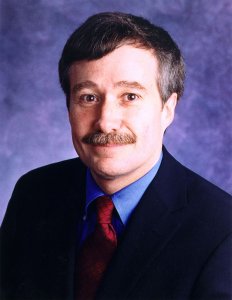
Wayne Eadie, senior vice president, Research, MPA
Photo: Magazine Publishers of America
New York, New York – According to a recent phone survey of 901 respondents conducted by Synovate on behalf of the Hispanic Magazine Coalition and the Magazine Publishers of America, Hispanic respondents of the survey have more trust in magazine information and advertising than any other media outlet including TV.
The study focused on “the richness and strength of Hispanics’ emotional connection with magazines.” Working with Magazine Publishers of America (MPA), the Hispanic Magazine Coalition, a group of nine companies with interests in Hispanic magazines, presented the findings to advertisers in a seven-city road show. The findings are based on 901 Hispanic telephone interviews with magazine and non-magazine readers conducted this summer by the market research company Synovate. It is described as the first industry-supported look into consumer engagement with Hispanic magazines.
“We’ve undertaken this initiative to better understand the Hispanic magazine reader,” said Wayne Eadie, senior vice president, Research, MPA. “Currently, Hispanic magazines get four percent of total media spending compared to 17 percent for the general market, which represents the gap in understanding the strong connection that magazines have with Hispanic consumers versus other media.”
“This study clearly establishes the viability of the Hispanic magazine market,” said Lou Lopez, vice president, Synovate. “The research also demonstrates that Hispanic magazines are able to generate readership engagement levels on a par or exceeding general market magazines.”
Forty three percent of the respondents trust magazine advertising, 38 percent trust TV by 38 percent and 25 percent believe in Internet advertising. Similarly, 47 percent of Hispanic magazine readers in the study trust the information reported in magazines, while only 37 percent of those surveyed deem Internet information to be credible. The research also shows that 85 percent of those surveyed read magazines, which is on par with the general market.
According to Synovate’s analysis Hispanics in the study appear to be less jaded by advertising than the general market. For example, Synovate found that 54 percent of survey respondents believe that magazine advertising provides them with something that they can’t find in other media such as TV, radio or the Internet. Additionally, 73 percent of respondents said that magazine advertising gives them good ideas about what to buy.
Synovate’s research reveals that Hispanics value magazines for qualities that are similar to that in the market such as education and personal escape. However, Hispanics show a greater propensity to value magazines for social connection, aspiration and cultural relevance than the general market.
The Hispanic Magazine Coalition revealed the survey findings in New York, New York; Chicago, Illinois; Coral Gables (Miami market), Florida; Los Angeles and Torrance, California; San Antonio, Texas; and for the Detroit market, Birmingham, Michigan. Members of the Hispanic Magazine Coalition include AARP Segunda Juventud, Hogar Latino LLC, Editorial Televisa, Latina, The National Association of Hispanic Publications, Meredith Hispanic Ventures, Muevelo, People en Español, and Selecciones.
Magazine Publishers of America is the industry association for consumer magazines. Established in 1919, MPA represents 240 domestic publishing companies with approximately 1,400 titles, 80 international companies and 100 associate members. Staffed by magazine industry specialists, MPA is headquartered in New York City, with an office of government affairs in Washington, DC.
Posted by Elena del Valle on October 3, 2006

Jeff Humphreys, director, Selig Center
Photo: Jeff Humphreys
According to “The Multicultural Economy,” a report on minority buying power from the Selig Center for Economic Growth at the University of Georgia’s Terry College of Business, Hispanic buying power in the United States will draw even with African-American buying power in 2006 at just under $800 billion; and is projected to exceed it in 2007.
Hispanics surpassed blacks as the nation’s largest minority group five years ago, based on population counts. In terms of spending power, the Selig Center indicates that 2007 will mark the first year that Hispanics control more disposable personal income than any other U.S. minority group.
The Selig Center estimated Hispanic buying power will be $863.1 billion in 2007, an 8.1 percent increase over 2006, while black buying power will reach $847 billion in 2007, a 6 percent increase.
“The economic clout of Hispanics has risen from $212 billion in 1990, when I first started doing this study, to $798 billion this year and I expect it to be almost $1.2 trillion five years from now,” said Jeff Humphreys, director of the Selig Center. “That’s more than 450 percent growth from 1990 to 2011. Non-Hispanic buying power is growing closer to a rate of 176 percent over the same period.”
“Still, even as Hispanic buying power overtakes African American buying power at the national level, it is important to recognize that in the majority of states the African American market will continue to be much larger than the Hispanic market,” he said. “This insight reflects the fact that Hispanics and their buying power are much more geographically concentrated than non-Hispanics or African Americans. For example, California alone accounts for 27 percent of all Hispanic buying power in the U.S.”
The Selig Center’s annual report includes state-by-state projections of buying power for the nation’s three most populous racial groups, as well as Hispanics, who are categorized by the U.S. Census as an ethnic minority and not a racial minority. Buying power, also referred to as disposable income, is the total personal income available for spending on goods and services after taxes.
The remarkable gains in Hispanic buying power are largely explained by immigration and population growth, Humphreys said. Between 1990 and 2011, the beginning and ending boundaries of the study, Hispanic population is expected to increase 126.4 percent, compared with 15.4 percent for the nation’s non-Hispanic population
Better employment opportunities and higher business ownership are the other driving forces boosting the Hispanic consumer market. The number of Hispanic-owned businesses grew by 31 percent between 1997 and 2002, triple the 10 percent rate of growth for all U.S. businesses.
Available for purchase as a pre-packaged book and CD, “The Multicultural Economy” estimates minority buying power by applying economic modeling and forecasting techniques to data from U.S. government sources. The model developed by the Selig Center integrates economic forecasting statistical methods with those of marketing research. In addition to the state-by-state breakdowns, the 2006 report also projects minority buying power for all metropolitan areas and counties in Georgia and Florida.
The Selig Center was established in 1990 in memory of Atlanta entrepreneur Simon S. Selig Jr., a 1935 Terry College graduate, by his son, Steve Selig, and daughter, Cathy Selig.
Posted by Elena del Valle on September 29, 2006

Baby Abuelita Productions founders Hilda Argilagos-Jimenez, Carol Fenster and Laura Santamaria with the grandparent dolls
Photo: Baby Abuelita Productions
San Antonio, Texas – Baby Abuelita dolls, produced by Baby Abuelita Productions, have been singing success with 35,000 dolls sold since May 2005. The Spanish-lullaby singing dolls made to resemble Hispanic grandparents and a baby come with Latin themed attire like guayaberas, batas de casa and eyeglasses. The grandparent dolls Abuelita Rosa and Abuelito Pancho sell for $29.99 and are available for purchase online and at major retailers. The baby doll, Baby Andrea, sells for $24.99 and may only be purchased on the company website.
The grandparent dolls are available for purchase at 126 Wal-Mart, 286 Target, and 94 Toys R Us stores. They are available at Navarros Pharmacy, Sentir Cubano, Lavins Baby Store, La Ideal Baby Store, and Baby Love in South Florida; The Learning Center in New Jersey, Spanishtoys.com and Language Land in the United Kingdom also sell the dolls.
Abuelita Rosa sings: “Arroz con leche” (Rice Pudding), “Que linda manito que tiene el bebé” (What a Pretty Little Hand the Baby Has), “Esa niña linda” (This Beautiful Baby Girl), “Pon, pon, pon el dedito en el pilón” (Put, Put, Put, Your Little Finger on Your Palm), “Azótate la mocita” (Pat Your Head), and “Duérmete mi niña” (Go to Sleep, My Baby).
Abuelito Pancho sings: “Los pollitos dicen” (The Baby Chicks), “Aserrín, aserrán, los maderos de San Juan” (Aserrín, Aserrán the wood craftsmen from San Juan), “Tengo una vaca lechera” (I Have a Cow), and “Campanitas” (Bells). Baby Andrea sings: “El patio de mi casa,” “Tengo una muñeca,” “A la rueda rueda,” “Amambrocha,” and “Duermete mi niña.”

Baby Andrea
Company representatives believe Baby Abuelita Productions’ rapid growth and acceptance by consumers, is a result of the company’s interest in preserving Hispanic traditions among young children and a shared vision for creating a product that promotes appreciation and love for the Hispanic culture. The dolls are meant to promote positive attitudes about the traditions of Latinos through childhood songs.
“There is an extraordinary demand and an unmet need for products that authentically capture and reflect the culture and traditions of Hispanic-Americans particularly as it relates to music,” said Hilda Argilagos-Jimenez, co-founder and president of Baby Abuelita.
In 2005, three working mothers, a teacher, a lawyer and a psychotherapist, developed the Hispanic themed grandparent dolls concept and established Baby Abuelita, the Miami-based maker of the dolls. Additional information is available online at BabyAbuelita.com
Posted by Elena del Valle on September 27, 2006
By Elena del Valle, MBA
Principal, LNA World Communications
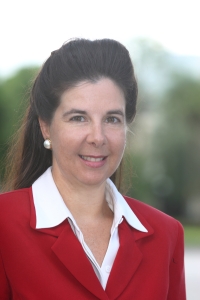
Elena del Valle, MBA
Photo: Cristian Lazzari
You are a spokesperson for your company, representing it for public speaking and media interviews. You are going about your everyday affairs, granting media interviews on a new product or service your company launched or a timely topic of general interest. All is going well and a Hispanic media representative calls. What should you do?
Should you respond to the request as you do with other general market requests? If you are wondering about the reach and importance of Latino media and Latino audiences nationwide, note that Hispanic buying power is estimated at around $700 billion a year and increasing rapidly. At the risk of stereotyping, remember Latinos are loyal buyers, especially for high ticket items, spend more than mainstream and other minority market buyers on basic products and like to purchase the best they can afford.
Click here to read the complete article
“Latino Media and Hispanic Media Training” audio recording


Presenters Federico Suverbi, Ph.D. and Elena del Valle, MBA
To purchase a downloadable or CD audio recording with presentations on Hispanic media training by Elena del Valle and on Latino media by Federico Subervi, Ph.D. visit the HispanicMPR.com Resources Section
Posted by Elena del Valle on September 21, 2006

Samsung digital camera
Photo: Terra.com
Samsung digital camera has launched its first online campaign “imagine NV A New Voyage Awaits.” This is the project’s first venture online as well as Samsung Digital’s first campaign targeting U.S. Hispanics via an online outlet. The campaign, called “imagina NV ¡Un nuevo viaje te espera!” in Spanish, can been seen online only at Terra.com and targets the young Hispanics online audience.
The campaign includes 728×90, 160×600 and 300×250 flash banner ads and newsletters to drive awareness to FotoGenios, a content hub on Terra.com. Content modules on the Terra.com home page will direct online users to the FotoGenios hub and Samsung retail partners.
FotoGenios provides visitors instructions “from click to print” and includes photography tips such as avoiding red eye. The section also features a guide of photo editing software, digital album or Internet upload image storage instructions.
In addition to advice on taking pictures with a digital camera, FotoGenios showcases new features available in the Samsung NV series (NV3, NV7 and NV10). The FotoGenios mini-site and all creatives were designed by Terra Networks in conjunction with Samsung. To see it go to Terra.com
Posted by Elena del Valle on September 6, 2006
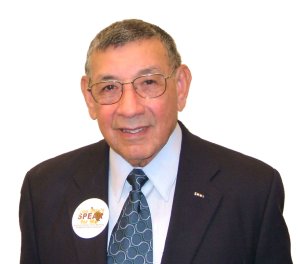
Colonel Al Rodriguez
Photo: You Don’t Speak For Me
For many Latinos May 2006, when numerous immigration related rallies and walkouts took place, will be remembered for the solidarity and determination of the Hispanic community. Different generations of Hispanics, and non Hispanics, took part in the demonstrations, from high school walkouts to retired immigrants marching in one of the many rallies throughout the country. Among the reasons they took a stand was to protest the criminalization of immigrants. Many demonstrators were against undocumented immigrants being labeled felons which would happen if some of the proposed legislatin is approved. More immigration related events are scheduled this month as a reminder to the rest of the country of the value and contributions of Latinos to America and a way to urge Congress to take immigration reform seriously. As additional demonstrations surface another Latino voice, albeit a much softer one, has risen with an opposing point of view.
You Don’t Speak For Me (YDSFM), a self described national coalition of concerned Americans of Hispanic heritage brought together by Colonel Al Rodriguez, charges that individuals and groups claim to speak on behalf of the Hispanic community in the United States as a whole without making homeland security a priority. The group is said to include first and second generation Americans as well as recent legal immigrants who believe illegal immigration harms America and guest worker amnesty will do the same.
According to the group’s website its members espouse five main principals: All immigration should be legal; undocumented immigrants should receive no benefits or privileges; amnesty should not be allowed; securing national borders should be a priority and immigration laws should be enforced; and immigrants should learn English.
“Homeland security is not a racial or ethnic issue, nor is it a partisan one. It is a matter of life and death, as current events have once again demonstrated how vulnerable our nation remains to fanatic Islamic terrorists,” said Rodriguez. “Our southern border is a sieve, a dangerous, life-threatening sieve. Criticism of the failure to control that border is, by no stretch of the imagination, an attack on any particular ethnic group. It is a legitimate criticism of the failure of the Bush Administration to protect the nation and of the people who violate our laws.
Rodriguez believes homeland security is at great risk due to the government’s failure to protect the nation’s borders. Rodriguez and his followers want to make it clear that the Hispanic community does not have a unanimous opinion on immigration issues. The organization’s members, scattered through out the country, are predominantly first generation American citizens. Coalition officers are Rodriguez, chairman, and four vice chairs, Mariann Davies, Claudia Spencer, Justin Rangel, and Maria Chojnowski.
“American Hispanics stand shoulder to shoulder with other Americans as our nation and our people face unprecedented threats to our security. If the terrorists succeed in breaching our borders and carrying out another attack, they will not discriminate in their campaign of mass murder. Pointing out that our borders are out of control is not offensive. The failure of either party to do anything about it is offensive, reckless and inexcusable,” said Rodriguez.
There are unconfirmed rumours that You Don’t Speak for Me has ties to FAIR, the Federation for American Immigration Reform, a national, nonprofit, public-interest, organization claiming 198,000 members dedicated to immigration reform. A You Don’t Speak for Me spokesperson didn’t respond to HispanicMPR.com questions on the subject. — Melissa Gonzalez contributed to this article.
Posted by Elena del Valle on August 31, 2006

Jeremy S. Jennings, principal attorney at Jennings Immigration Law Office
Photo: Jennings Immigration Law Office
Knoxville, Tennessee — Jennings Immigration Law Office recently launched the first Spanish-language version of its immigration oriented website. Although the English and Spanish version of the firm’s website are similar, the Spanish version includes information of particular interest to Spanish speakers from Central and South America.
“One of the challenges that the Latino community faces is easy access to reliable immigration information. By offering the JenningsImmigration.com website in Spanish, I hope to help bridge this gap,” said Jeremy S. Jennings, principal attorney, Jennings Immigration Law Office. “Immigration law is filled with difficult legal terms and concepts. It also involves many different government agencies. Our first version of the Spanish site provides links to Spanish-language websites offered by the different government agencies, where they are available, and provides a glossary of immigration terms in the Spanish language as well. Future versions of the Spanish site will offer immigration news updates and commentary as well.”
The Spanish language version of the website includes information on hiring an attorney, types of services the law firm offers, a list of resources including links to websites with content in Spanish, and how to become involved in the political process by contacting legislators.
JenningsImmigration.com and espanol.jenningsimmigration.com, the firm’s two website versions, were developed by the Nashville-based Website Strategy Company, MediaJolt. Jennings Immigration Law Office is a Knoxville-based immigration law firm.
Posted by Elena del Valle on August 29, 2006
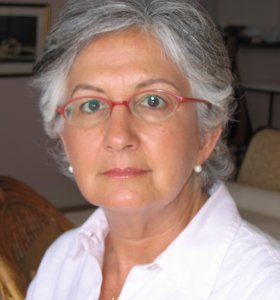
Ileana Oroza, director, University of Miami Spanish-language Masters in Journalism Program
Photo: Ileana Oroza
The Pew Hispanic Center recently released the “Cuban Fact Sheet” with updates on the 1.4 million Cubans in the U.S. The information in the Fact Sheet is based on Census data, Pew, Institute for Public Opinion Research, and Cuban Research Institute of Florida International University opinion polls. Pew researchers indicate Cubans represent 4 percent of Latinos in the U.S. and are distinct from other Hispanic groups. In general, they are older, have a higher median household income, a higher educational level and a higher rate of home ownership than other Hispanic groups.
“I’m not surprised by most of the information; not even by the significant increase in the number of Cubans who favor a dialogue with the Cuban government. That is part of a healthy trend we have been watching for the past few years,” said Ileana Oroza, director, Spanish-language Masters in Journalism Program, University of Miami. “Clearly Cubans in the United States are becoming more comfortable with the notion that it’s more productive to discuss issues and try to reach consensus that it is to build walls. The higher poverty rate among older Cubans is a cause for concern.”
According to Pew’s findings Cubans are more likely to think of themselves as white than are other Latinos. They are also more likely than other Hispanics to think of the U.S. rather than their country of birth as their real homeland. More than half of Cubans (52 percent) who responded to the Pew Hispanic Center 2006 National Survey of Latinos thought of the U.S. as their real homeland. Only 33 percent of Puerto Rican respondents, who are U.S. citizens by birth, considered the U.S. their real homeland. Mexican and Central and South American respondents, at 36 percent and 35 percent respectively, showed slightly higher rates than Puerto Ricans.
“It’s interesting to note the high number of Cubans who say they consider the U.S. to be their real homeland; again, not surprising. It brings to mind the contributions that Cubans have made to U.S. culture, Pulitzer Prize winners, Obie award winners, top dramatists, novelists, scientists, business leaders. We’re not quite 1.5 million, but we’ve made a home here and put our talents to work for this country,” said Oroza.
Pew also highlights that there are almost twice as many foreign born Cubans, (912,686) as U.S. born Cubans (535,998). At the same time, U.S. policy, according to the Fact Sheet, has been more welcoming to Cubans than to any other group from Latin America. Virtually all Cuban migrants who touch American soil are allowed to remain in the country.
Florida is home to more than two thirds of Cubans (990,000) and 70 percent of Florida Cubans are U.S. born. Other states with large Cuban concentrations are New Jersey, New York, California and Texas. More information is available online at the Pew Hispanic Center.
Posted by Elena del Valle on August 24, 2006

Scene from new Spam Spanish language ad
Photos: Hormel, San Jose Group
Chicago, Illinois — Hormel Foods Corporation will launch its first U.S. Spanish-language television commercial for SPAM®, its well known brand of canned luncheon meat. The 30-second ad, developed and produced by Hormel’s Hispanic advertising agency of record, The San Jose Group (SJG), first aired August 14, 2006. The commercial will be piloted in Los Angeles and supported with outdoor advertising and free-standing inserts.
According to promotional materials, the spot depicts two young professional men on their way home from work in a modern, downtown setting. One of them imagines SPAM® Classic for dinner. His antagonist steals the thought from above his head and runs away with it. After a gymnastic-filled chase scene, the “hero” reclaims his original thought. Upon his return home, his thought turns to reality, when his wife welcomes him with an enticing meal featuring SPAM® Classic. The slogan “Imagínalo. Saboréalo.” (Imagine it. Taste it.) plays against shots of meals that can be prepared with SPAM®.
“The mission of this execution is one of developing not only our brand, but also our category,” remarked Chris Durren, senior product manager, Hormel Foods Corporation. “This commercial will definitely get our target’s attention and help her connect with SPAM® in a culturally relevant way.”

From the Spam® commercial
Although SJG has been working with the SPAM® brand since 2004, this year marks the product’s entrance into Spanish-language television in the U.S. The brand has been in existence since 1937 and enjoys awareness among general market households. According to the company’s research, nearly 77 percent of U.S. Hispanics are non-users of the SPAM® Family of Products. Hormel and SJG hope win over Hispanic women to, especially heads-of-household, with the new commercial.
“We are positioning SPAM® to fit into our target demo’s busy lifestyle,” said George L. San Jose, president and COO, The San Jose Group. “As such, we leveraged a high-energy, urban approach to solicit a curiosity of SPAM® as an incentive to trial.”
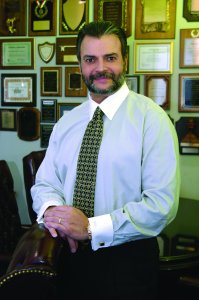
George San Jose
Incorporated in 1981 and headquartered in Chicago, The San Jose Group is a consortium of marketing communications companies specializing in reaching the Hispanic and non-Hispanic markets in the U.S. and Latin America.
Hormel Foods Corporation, based in Austin, Minnesota, is a multinational manufacturer and marketer of consumer-branded food and meat products. For the past five years, Hormel Foods was named one of “The 400 Best Big Companies in America” by Forbes magazine.
Posted by Elena del Valle on August 8, 2006
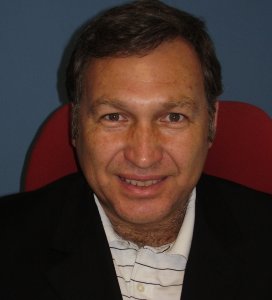
Luis Baraldi, CEO, Baral
Photo: Baral Group Studios
Coral Springs, Florida – “Mexico Lindo y Futbol,” produced in the Baral Group Studios in Coral Springs, Florida and in Mexico City, covers soccer, the lives of Mexicans living in the U.S., their culture, and their interest in Mexican soccer. The program, which claims a viewer ship of 11 million homes, has been broadcast since May 2006 on GolTV Monday through Friday at 11 p.m.
“This program gives us a chance to show Mexico through various points of view. Soccer is a universal sport and the leagues in Mexico are among the most important in the world,” said Luis Baraldi, CEO, Baral. “However we don’t only show soccer since Producer Alina Baraldi and Exec Producer Julio Sonino from GolTV can be very creative in including the culture, and lifestyles from the major Mexican cities, and the beauty of Mexico and how they relate to soccer.”
The show anchor is Javier Vargas. Other staff include co-anchor Gerardo Ruiz, and Paloma Marquez from the studios in Coral Springs. Vargas reports on soccer while Marquez focuses on Mexicans living in the U.S., their cultures, and their continued dedication to Mexican soccer. Gustavo Ramírez España, Santiago Cortes, Víctor González, Guillermo Portillo, and Alfonso Hidalgo are the Mexican correspondents and Luis Arrieta is the reporter in Los Angeles, California.
Other programs produced by Baral Group include, “Tenis Con Clerc”-ESPN, “A Year in the Life of Lorena Ochoa” for ESPN and“Soccer Legends” for HBO and Canal+. GolTV is devoted exclusively to soccer, 24 hours a day, broadcasting over 1,500 games per year, in English and Spanish. Baral Inc. specializes in the production of programming for various networks in the U.S. and Latin America.
























